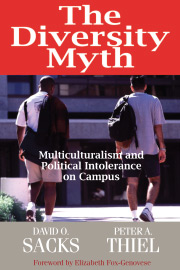Long before Washington politicians discovered the strategy of “talk right, govern left,” university administrators were mastering its use, paying lip service to conservative alumni off campus while using their contributions to fund liberal activism on campus. This strategy only works as long as its targets are kept in the dark, however, and recent events at Stanford University are shedding some long overdue light.
After the university developed a “Strategic Communication Plan”—a secret document outlining how to deal with alumni, the media, etc.—the plan leaked to local media and prompted an outcry. The backfiring of this often-blunt, 30-page public-relations blue-print may spark a new beginning in relations between elite universities and their alumni donors.
The centerpiece of Stanford’s marketing strategy is a list of key words for faculty and administrators to repeat when dealing with the public. The approved “lexicon of hyperbole,” as one professor called it, includes “incomparable,” “challenging,” “boundless,” and stunning.” Despite the elimination of Stanford’s Western Culture program, another key word is “Western,” a term disfavored in every room on campus except, apparently, the Office of Development. (Oddly, the Strategic Communication Plan elaborates that ”‘Western” connotes “warm weather”—a big plus.) The phrase “burning the midnight oil” is recommended to describe student life at Stanford, where the average grade is an A- and students receive academic credit for tennis and golf.
Some of the plan’s tactical recommendations are tellingly at odds with its overall message. While urging faculty and administrators to trumpet Stanford’s “diversity,” it warns that “an institution must speak with one voice, not many,’ and that for maximum effect, a single message must be repeated for “continuity and consistency.” Needless to say, it doesn’t mention the university motto, “let the winds of freedom blow.”
Similarly, officials are urged to tout alumni excellence, but the plan itself displays naked contempt for the intelligence of former students, directing that the university’s public message be kept as “simple” as possible, so as not to exceed their “reading ability.”
The document identifies Stanford’s “independent skeptical faculty culture” as a major obstacle to conveying a positive image. “Independent” clearly does not mean intellectually diverse. Stanford’s humanities faculty, for instance, is over 80 per cent Democrat. What it means is rather that the faculty can’t be controlled. While administrators are capable of modulating their words off campus, professors are potential time bombs from a public-relations/fundraising standpoint.
History professor Kennell Jackson recently blew up, for instance, when his course on black hairstyles was exposed. Another ongoing liability is Donald Kennedy, the former president of Stanford who bilked the Federal Government out of millions in research funds and who now teaches a course on ethics. University apologists say that critics pick and choose marginal examples from among the faculty. But those they call marginal believe themselves—much more honestly—to be the norm.
Official communication “vehicles” identified in Stanford’s secret PR plan include the slick alumni magazine and sporting events, such as the annual football game on Homecoming Weekend. The latter consists of a series of catered buffets and celebrity speakers with the Potemkin-like goal of keeping alumni from looking at the actual workings of the university. Never once in our combined 11 years at Stanford did we see an alumnus visit a classroom—which is obviously not an approved communication “vehicle.”
Since the underlying purpose of Stanford’s Strategic Communication Plan was to avoid an actual public reporting of current campus events, it is not surprising that the plan’s leak to local newspapers has itself prompted a public-relations crisis. University President Gerhard Casper, who is acknowledged as an important contributor to the plan on its first page, was forced to disavow it, noting ruefully that it was “never meant for any press attention.” Nevertheless, Casper said that he still plans to draw on the strategy in talks to alumni.
All in all, not a good reflection on an incomparable, challenging, boundless, stunning university.








